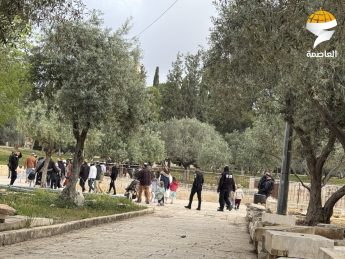The Israeli Supreme Court in Jerusalem held a session on Monday 19 December 2016 to look into an appeal tabled by the Palestinian family of Sub Laban-Gaith against a decision passed by the Magistrate Court in 2014 to evacuate their house in favor of a settler organization without the Supreme Court issuing any ruling. Meanwhile the Palestinian family sticks tight to its positions of staying at their own house in the face of Israeli displacement and uprooting attempts.
The PIC reporter said the Israeli Supreme Court decided to keep the family of Sub Laban inside the house under certain conditions which was refused by the family thus the court ended the session without issuing any verdict.
The lawyer of Kollel Galicia Trust (settler organization) presented the claims of Jewish settlers to the house before the court and said that the Sub Laban family had abandoned the house some 30 years ago and thus they are not entitled to rental protection based on a contract issued by the Hashemite Kingdom of Jordan in 1953.
For his part the lawyer of the Palestinian family Mohammed Dahla negated the claims of the settlers and appealed the decisions of the Supreme and Magistrate Courts which were based on claims made by Israeli settlers and ignored the claims of the Palestinian family without taking into consideration the level of damage the family might endure in case of evacuation.
Settlement Refusal
The court suggested to both parties to reach a settlement which was refused. The settlement states that the second generation of the family (the parents) Nour Gaith and Mustapha Sub Laban enjoys rental protection to rent the house with their children excluded from this protection a suggestion under which the family enjoys protection as long as the second generation (the parents) are still alive only.
The Jewish settlers refused this settlement and their lawyer suggested moving the family into a small store a suggestion that was denounced outright by the Palestinian side. The session ended later without issuing a decision and it is expected to have a decision issued soon either to accept or refuse the appeal.
A delegation of foreign diplomats and the Office of The United Nations High Commissioner for Human Rights attended the session.
The lawyer of the family Mohammed Dahla said the foreign presence during the court’s sessions is important and it affects the court without a shadow of doubt and it is necessary to maintain this foreign presence at the hearings.
Continuing Displacement Attempts
The Israeli occupation authorities and settler organizations have been trying to push the family of Sub Laban-Gaith to leave its house since the 70s as the Israeli occupation authorities prevented the family from doing any renovation or repair works to the house and later Israeli settlers shut down the house’s entrance.
And despite all these attempts the family remained steadfast in its house and against settlers’ expansion and struggled before the Israeli occupation courts for more than 20 years until it finally gained back the right to live in it.
The Israeli occupation authorities attempted to kick the family out of the house again in 2010 after it granted the Kollel Galicia Trust which claims that the house has been a Jewish-ownership since the old times.
The settler organization submitted a request to the court to evacuate the Palestinian family from the house in 2010 claiming a Jewish family should inhabit the house only. The settler group is one of many settler groups which seek to evacuate Palestinian families from the old town of Jerusalem and to take over their houses in the last few years.
According to statistics revealed by the United Nations Office for the Coordination of Humanitarian Affairs (OCHA) more than 180 Palestinian families in Jerusalem are at the risk of forcible displacement from their houses over cases brought against them by Israeli settlers or settler organizations at Israeli courts under the claim of not owning the real estate or losing the protected rental status granted to them.















